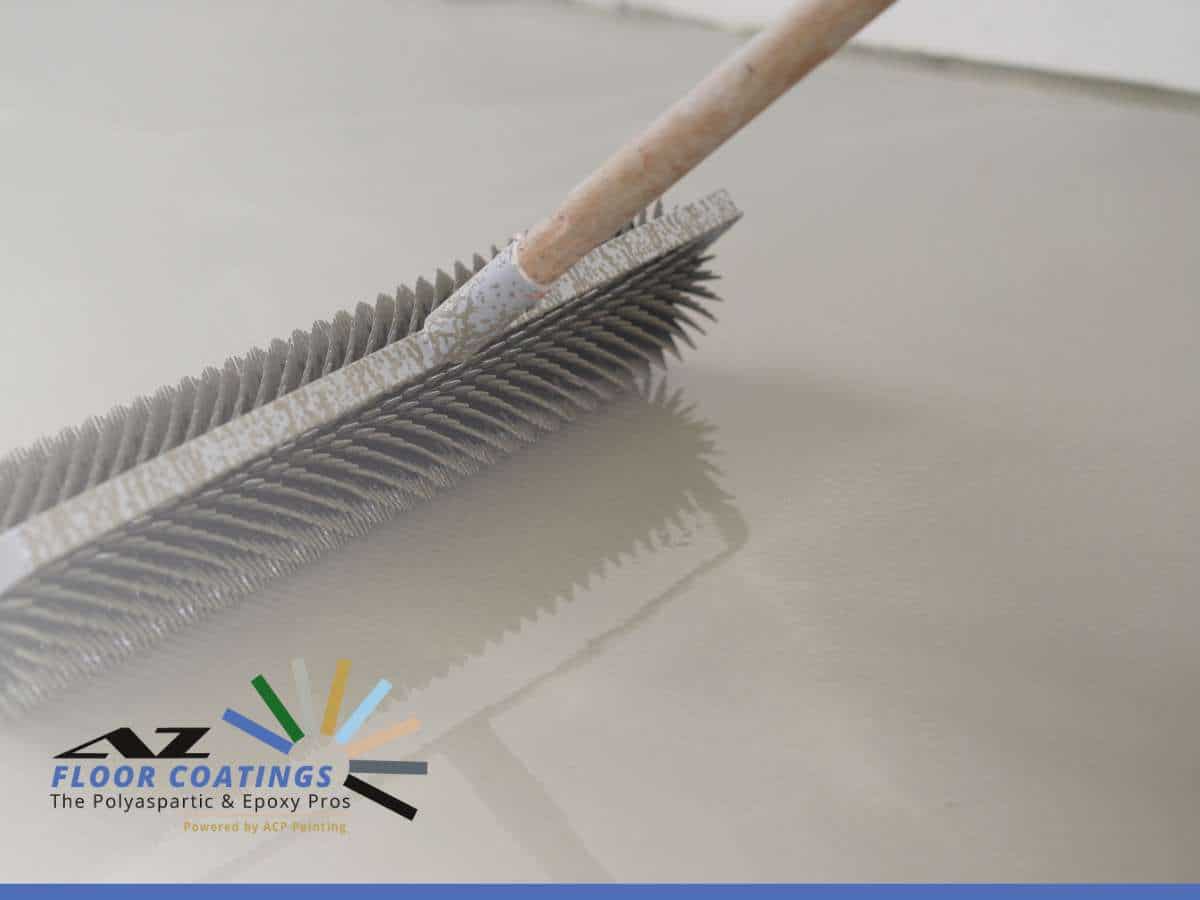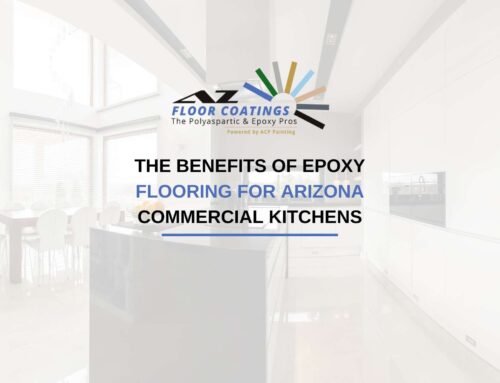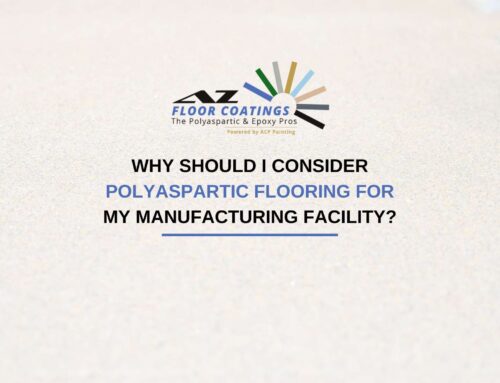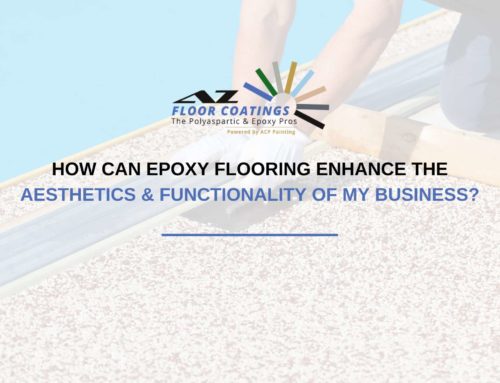Factors & Signs To Consider When It’s Time To Recoat Your Polyaspartic or Epoxy Floor Coating
Polyaspartic and epoxy floor coatings have become increasingly popular due to their durability and aesthetic appeal. However, one common question among property owners and facility managers is how often they should apply polyaspartic or epoxy floor coatings to maintain their effectiveness.
In this blog post, we’ll delve into the essential considerations and guidelines surrounding the frequency of applying polyaspartic and epoxy floor coatings. We’ll explore the factors that influence the need for recoating, such as the type of environment, foot traffic, and the quality of the initial application.
By the end of this article, you’ll know when it’s time to refresh your floor’s finish, ensuring it remains appealing and capable of withstanding the test of time.
So, if you’re eager to learn how to prolong the life and beauty of your floors, keep reading!

How Often To Recoat Polyaspartic Or Epoxy Floors Based On Environment & Sun Exposure
Many things influence the recoating frequency, which is why we recommend taking notes of them so you can be well-informed about your polyaspartic or epoxy floor.
The more you understand what shortens your floor’s lifespan, the more you’ll be able to take care of it properly.
Type Of Environment
The type of environment in which epoxy and polyaspartic floor coatings are installed can significantly impact the need for recoating.
The coatings are more likely to deteriorate faster in environments exposed to harsh conditions such as heavy machinery, chemicals, or extreme temperature fluctuations.
Industrial settings, workshops, and manufacturing facilities fall into this category. The constant stress and abrasion on the floor can lead to quicker wear and potential damage to the coatings.
Conversely, residential spaces or commercial areas with lower foot traffic and less exposure to chemicals and abrasives may require less frequent recoating. For instance, a residential garage or a retail store with moderate foot traffic would typically experience slower wear and tear on the floor coatings.
In short, high-stress environments with intense use and exposure to challenging conditions require more frequent recoating of epoxy and polyaspartic floor coatings, while low-impact environments require recoating less often.
Sun Exposure
Sun exposure can also impact polyaspartic and epoxy flooring due to the effects of ultraviolet (UV) radiation from the sun.
Here’s a brief explanation of how sun exposure affects these coatings:
- UV Degradation: Both polyaspartic and epoxy coatings are susceptible to UV degradation. This degradation is often referred to as “chalking”.
- Color Fading: Sun exposure can also cause color fading in epoxy and polyaspartic floor coatings. This is particularly obvious in outdoor settings or areas with large windows that allow direct sunlight to hit the floor.
- Reduced Lifespan: The breakdown of the coating’s chemical structure due to UV exposure can reduce its lifespan. This means that the protective qualities of the coating, such as resistance to stains and chemicals, may diminish faster in areas with high sun exposure.
To mitigate the effects of sun exposure on polyaspartic and epoxy coatings, it’s advisable to use UV-resistant coatings or to apply a UV-resistant topcoat. Additionally, regular maintenance can help prolong their life and appearance.
7 Visual and Functional Signs It’s Time To Recoat Your Polyaspartic Or Epoxy Floor Coating
Knowing when to recoat polyaspartic and epoxy floor coatings is crucial to maintaining their performance and appearance.
These are some indicators that can help you identify the need for recoating:
Visual Indicators:
- Loss of Gloss: One of the most obvious visual signs is a loss of gloss or shine on the surface. Over time, foot traffic, chemical exposure, and general wear and tear can dull the coating’s luster.
- Surface Scratches: If you start to see an increase in surface scratches, scuffs, or abrasions that are no longer easily removed with regular cleaning, it may be time for recoating. These scratches can make the floor look worn and tired.
- Color Fading: Epoxy and polyaspartic floor coatings can experience color fading, especially when exposed to UV rays. If the colors on the floor appear less vibrant and have started to fade, the coating is already deteriorating.
- Stains and Discoloration: Stubborn stains that no longer respond to cleaning efforts can be a sign that the protective layer of the coating has been compromised. Discoloration may also occur, making the floor look uneven.
Functional Indicators:
- Reduced Chemical Resistance: If the floor coatings were initially chosen for their chemical resistance, a decrease in this resistance can indicate the need for recoating.
- Difficulty in Cleaning: As the coating wears down, it becomes harder to clean and maintain. If dirt and grime stick to the surface more often, then the coating’s protective properties are diminishing.
- Surface Erosion: In high-traffic areas or places with heavy machinery, the coating may erode or wear away in localized spots, leading to uneven surfaces and safety risks.
Recommended Recoating Intervals For Polyaspartic & Epoxy Floors Based On Setting, Traffic & Sunlight Exposure
Another thing that influences the frequency is the setting.
In residential areas, a recoating every 3 to 5 years is typical. Commercial and industrial spaces with higher traffic may need recoating every 1 to 3 years. As we said earlier, epoxy and polyaspartic floor coatings with high exposure to sunlight may require more frequent recoating due to UV damage.
Proper maintenance, quality of the initial application, and specific coating formulations also influence recoating intervals.
Keep in mind that regular inspections and professional advice help determine the best schedule.
Contact AZ Floor Coatings For a Professional Assessment Of Your Polyaspartic Or Epoxy Floor Recoating Needs
To ensure your floors stay in the best condition possible, we recommend consulting with the experts in AZ Floor Coatings. We can provide tailored advice and professional assessments of your flooring needs!
Contact us to determine the ideal recoating schedule for your specific environment!
AZ Floor Coatings
19342 N Maricopa Rd
Maricopa, AZ 85139
Phone: (480) 764-3556
Email: [email protected]





